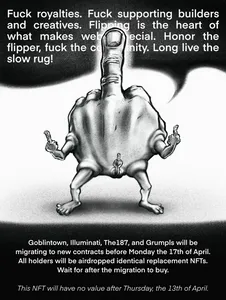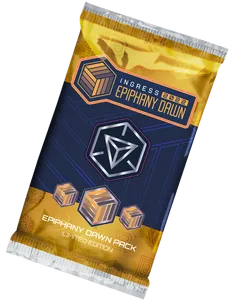There has been an ongoing controversy in the NFT world over creator royalties. Although NFTs are often talked up as being good for artists because they enable royalties to be paid even after the initial sale, these payments are rarely enforced by the smart contract and are instead up to marketplaces to enforce. In the last six months or so, NFT marketplaces have emerged that follow a "royalty optional" model, sparking a race to the bottom where OpenSea and other incumbents have also cut royalty protections to remain competitive.Although NFTs are often thought to be immutable, permanent links to their associated artwork, that's often not the case in practice. Many NFTs store metadata off-chain, or otherwise enable after-the-fact changes.
Goblintown is a collection of NFTs that launched in May 2022, quickly going viral and sparking a phenomenon of Twitter spaces where members spent hours making goblin noises into their microphones. Originally free to mint, the NFTs began selling for thousands of dollars on the secondary market. Now they trade for around 0.38 ETH (~$800) apiece.
In an apparent protest against the willingness of traders and marketplaces to stop honoring royalties, Truth Labs (the group behind Goblintown) changed the artwork for Goblintown and all of their NFT collections to an illustration of a dancing middle finger, with smaller middle fingers emerging from where its arms and genitals would be. The new image reads, "Fuck royalties. Fuck supporting building and creatives. Flipping is the heart of what makes Web3 special. Honor the flipper, fuck the community. Long live the slow rug." At the bottom, the image states: "Goblintown, Illuminati, The187, and Grumpls will be migrating to new contracts before Monday the 17th of April. All holders will be airdropped identical replacement NFTs." The new NFTs will enforce royalties on-chain, preventing marketplaces from allowing users to circumvent them.
Some embraced the new NFTs, while others accused Truth Labs of "rugging". Some people were horrified by the fact that NFTs that they owned could be changed after the fact without their consent, a fact they were not previously aware of. One owner wrote, "So your telling me I spent $1,000s of dollars and have 10 goblintowns for them all to now be dudes shaking their weiners?"










